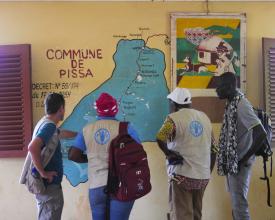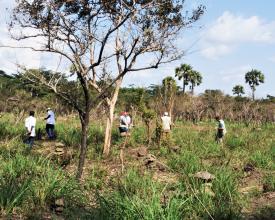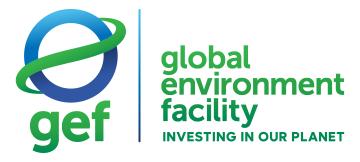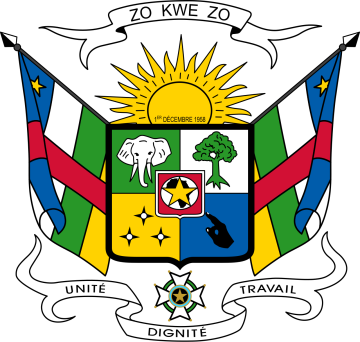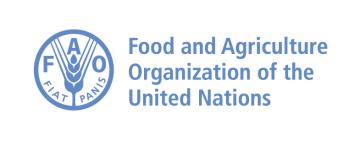
Increasing CAR's Commitment to Forest and Landscape Restoration at the National and Sub-National Levels
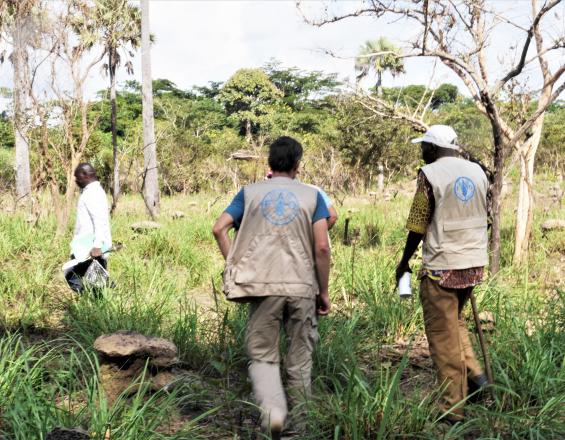
The Restoration Initiative (TRI) in Central African Republic (CAR) is working to increase the commitment to forest and landscape restoration at the national and sub-national levels. To do so, they have initiated projects to fill the knowledge gaps in restoration opportunities and the valuation of ecosystem services and to develop policy and regulatory frameworks that increasingly promote restoration, sustainable land management, maintenance and enhancement of carbon stocks in forests. TRI CAR has found graduate students who are beginning to conduct research to fill the knowledge gaps that are needed for stronger policy networks, while a technical working group is working to identify restoration opportunities in the country. Additionally, TRI CAR has initiated the process of revising the country’s forest policy, reviewing and analyzing local development plans of forest communities, and facilitating the design of an upgraded national wood energy supply plan.
TRI is a GEF-funded project.
Context
Challenges addressed
The largest challenges TRI CAR is facing in reaching its policy milestones and goals are the availability of financial resources and the ability to reflect complex and lengthy processes in final policy documents. Without the necessary financial resources, the process of elaborating policies like the forest policy and conducting research to fill knowledge gaps, especially in a participatory and inclusive way, would not be possible. However, as more partners are contacted, there has been a greater show of support and enthusiasm in ensuring the inclusive processes have the necessary resources. Additionally, it can be difficult to reflect the complex and lengthy processes that preceded new policies within final documents and legal text in a way that ensures all the challenges on the ground are considered. This is why a participatory approach is vital and likely the most equipped way to present the numerous complexities in policy.
Location
Process
Summary of the process
Together, TRI CAR’s work to fill knowledge gaps in restoration opportunities and the valuation of ecosystem services and to improve national and sub-national policy and regulatory frameworks to support restoration and sustainable land management will help increase the country’s commitment to FLR. The information found through the graduate projects with ICRA and ISDR focused on the valuation of ecosystem services and the geospatial data analysis conducted by the technical working group trained by TRI, provides on-the-ground research informing TRI CAR’s priorities and recommendations for the policies being developed. These policies include a revised forest policy, a joint management plan for the southwest territory, and an upgraded wood energy supply plan for Bangui. With technical input based on research and geospatial data, TRI CAR is able to better facilitate the elaboration of policies that adequately address the varying issues facing restoration, sustainable land management, maintenance of carbon stocks, and emission reductions in the LULUCF sector.
Building Blocks
Filling knowledge gaps in restoration opportunities and the valuation of ecosystem services
To increase CAR’s commitment to forest and landscape restoration at the national and subnational levels, TRI CAR is working to fill existing knowledge gaps in the valuation of ecosystem services and restoration opportunities. To do this, TRI CAR has contracted two graduate students with the Central African Agricultural Research Institute (ICRA) and the Higher Institute for Rural Development (ISDR) to carry out a valuation of ecosystem services. As the projects develop, the on-the-ground research will inform TRI CAR’s technical recommendations for the various policies being elaborated. Similarly, to help identify restoration opportunities, TRI has initiated the creation of a geospatial working group that will focus on finding restoration priority areas. This will also lay a base for TRI CAR’s policy input, as the team will pursue measures focused on the restoration opportunities identified in geospatial data analysis.
Enabling factors
To successfully engage in projects that fill knowledge gaps necessary for policy elaboration, the work of ICRA and ISDR in supervising and leading the graduate projects looking at the valuation of ecosystem services will be critical. Additionally, to best enable the technical working group working on analysis on geospatial data, TRI CAR has conducted trainings on how to collect and use data analysis. The trainings ensured the working group most effectively analyzes the geospatial data.
Lesson learned
Contracting two projects to research the valuation of ecosystem services and bringing together a technical working group to conduct analysis of geospatial data to identify restoration opportunities, TRI CAR is learning critical lessons around how to work with local institutions to facilitate knowledge generation and how to train participants to best implement project research. TRI CAR is growing its understanding of how working with institutes like ICRA and ISDR through the graduate projects will help policy commitment and how collaborating with outside actors can provide greater resources for filling knowledge gaps. TRI CAR is also strengthening its ability to train participants and local actors in collecting and analyzing data required for the effective development of the country’s policies. Ultimately, TRI CAR’s work has also provided the team with invaluable information it can use to provide technical input and recommendations for the elaboration of national policies related to restoration and sustainable land management.
Developing policy and regulatory frameworks to promote restoration, sustainable land management, and emissions reductions
TRI CAR is actively working to facilitate the development of policy and regulatory frameworks that promote restoration, sustainable land management, the maintenance and enhancement of carbon stocks in forests and other lands uses, and emission reductions from the land use, land-use change, and forestry (LULUCF) sector and agriculture. This includes initiating discussions with the Ministry of Water, Forests, Hunting, and Fishing on the revision process of CAR’s forest policy. TRI CAR will bring all of the stakeholders together to define and plan the process of revision and provide the ministry with technical input. TRI CAR is also conducting documentary analysis of local development plans of five forest communities – Mbata, Mongoumba, Nola, Pissa, and Yobé – and is in discussions with the Ministry of Environment and Ministry of Territorial Planning to develop a joint management plan for the southwest territory so the local development plans can be implemented in a broader vision. Additionally, TRI CAR is helping upgrade the Wood Energy Supply Plan (WISDOM) in Bangui with recommendations developed from research on wood energy production and market.
Enabling factors
TRI CAR is able to help develop policies support FLR and sustainable land management because of the political will of CAR’s major ministries to improving laws and regulations to support its restoration goals. It is also possible because of TRI CAR’s ability to bring together the various stakeholders implicated in the LULUCF sector and restoration activities in CAR. Without input and recommendations from the numerous actors, the policies could not as adequately address the diverse priorities of everyone affected by FLR.
Lesson learned
Through the process of helping CAR’s various ministries update policies related to restoration, sustainable land management, and emissions reductions, TRI CAR has learned multiple lessons around the process of policy elaboration in CAR and how policy updates can better address the needs of the various stakeholders. Between working with the Ministry of Water, Forests, Hunting, and Fishing on the revision of the country’s forest policy and the Ministry of Environment and Ministry of Territorial Planning on developing a joint management plan for the southwest territory to better implement the local development plans, TRI CAR is learning how the different ministries approach policy development and how the team can work with them all to ensure policy cohesion across sectors. Additionally, in its work to provide information on the market and practices of wood energy production in Bangui, TRI CAR has gained knowledge around how wood energy can affect restoration and how best to approach its management.
Impacts
A strengthened policy and legal framework around FLR and sustainable land management and the subsequent increase in commitment to restoration in CAR will be significant because it will present a major change with previous practice and help CAR achieve its overall restoration goals. With an updated forest policy and greater knowledge and awareness of existing policies and their gaps, CAR will usher in a new perspective at the national and subnational levels that much greater prioritizes restoration and sustainability within land management. Similarly, with a strengthened enabling environment for FLR, the policy work TRI CAR is doing will likely result in a greater uptake of FLR projects and have a triggering effect on the development of new restoration policies. By outlining the implementation of FLR and how forests should be managed sustainably, governments, private actors, and local communities will better understand how to enact FLR projects and use land sustainably. With greater commitment to FLR, subnational governments will also gain greater insight on how to enact restoration policies at the local level. Ultimately, TRI CAR’s policy work will also help reach the country’s restoration commitments because of this increase in restoration activities.
Beneficiaries
The beneficiaries include forest companies that have better guidance on sustainable land management, ministries that have inclusive policies to guide development, and local communities who can use coherent policies to manage forests.
Sustainable Development Goals
Story
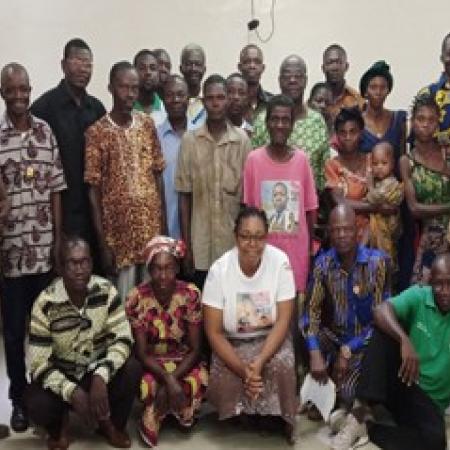
TRI project spoke to Brigitte Agbasso, 52, in Central African Republic. She is a widow and group leader in the community of Yobé and lives in Mona Sao. She cultivates her farm every year, working on one hectare of open forest annually. Read her story in her own words below:
“The village was facing enormous difficulties in finding arable land within 5km of it. The land was severely degraded, and production was insufficient to feed the household members.
She said “The WWF experts who often passed through Mona Sao stopped off one day in the village to announce that a project led by FAO would be carried out in our village to propose alternatives to improve our agricultural activities and avoid impacting our valuable protected areas”.
Village chiefs and prominent community leaders from the clustered villages of Pissa, Bombé, Boyama, Boyali and Bongombé in the southwest of the country had long sought to protect nearby forests and surrounding environments. It was through in-person meetings at the project sites that the TRI CAR project first learned of the coordinated efforts among three villages to establish a community forest.
She continued, “The TRI project has trained us to establish tree nurseries and collect seeds in the forest. Each household with fallow land will repurpose it to restoration actions and be responsible for planting trees and benefiting from agricultural seeds to maintain the trees in their fields. Our nursery site has grown so well.
Thanks to the project, we plan to pool a share of land for the cooperative’s agricultural production and set up a village savings bank to support the members” added Brigitte.
The TRI project in the Central African Republic (CAR) is focused on the five subprefectures in the southwest of the country, which is mainly forest area, including the prefecture of Lobaye and the commune of Pissa. TRI project also supported the development of a simple forest management plan with two major sections, including capacity building and support in putting together and submitting an application for the allocation of community forests.


